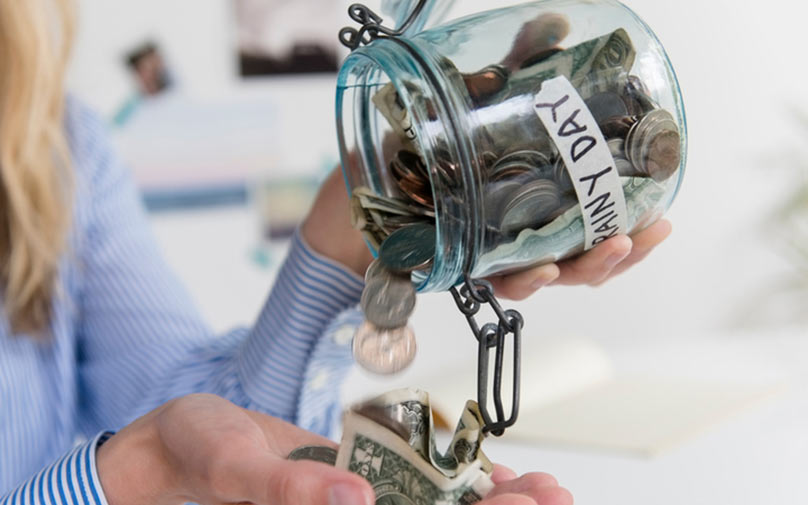
Life is full of surprises, and not all of them are pleasant. Car repairs, medical emergencies, and unexpected job losses can leave you scrambling for cash. That’s why it’s important to be prepared for those rainy days by building a solid financial safety net. Hopefully, you’ve already started saving for your rainy-day fund, but if not, here are some tips for managing your finances to withstand life’s unexpected events.
Understanding the importance of a rainy-day fund
A rainy-day fund is a stash of money set aside to cover unexpected expenses that are beyond your regular living costs. These can include car repairs, medical bills, or other unforeseen events that can put a dent in your budget. Having funds can provide peace of mind and may help you from strictly relying on high-interest credit cards or loans to cover these expenses.
Rainy-day fund vs. emergency fund
It’s crucial not to confuse a rainy-day fund with an emergency fund. While both serve as financial safety nets, they cater to different needs.
- A rainy-day fund is for smaller, unexpected expenses like car repairs or home maintenance in the range of $500 to $2,000.
- An emergency fund is reserved for more significant, unexpected events or life changes, such as losing your job or dealing with a medical emergency. It should cover 3-6 months of living expenses.
Assessing your financial situation
Before you start saving for a rainy day, consider the following factors:
- Income: How much money do you earn? Is your income stable, or does it fluctuate?
- Expenses: What are your regular monthly expenses? Are there any areas where you can cut back to save more money?
- Debts: Do you have any outstanding debts, such as credit card balances or loans that should be prioritized?
- Savings: Do you already have some savings set aside that could be allocated to your rainy-day fund or another financial goal?
Setting your rainy-day fund goal
Once you’ve assessed your financial situation, it’s time to set a savings goal for your rainy-day fund. Factors to consider, such as the age and condition of your car, the age of your home appliances, and your insurance coverage, may come into play because of the likelihood of you needing those funds. Also, if you own a home or have a high insurance deductible, you may need to save more than someone who rents or has lower deductibles.
Choosing the right savings account
To make the most of your rainy-day fund, it’s essential to choose the right savings account. A high-yield savings account that offers competitive interest rates, is FDIC-insured, and allows for quick and fee-free withdrawals might be a good option. This way, your money will earn interest, and you’ll be able to access it when you need it.
Saving strategies for building your rainy-day fund
There are several strategies you can use:
- Set up direct deposit: Arrange for a portion of your paycheck to be deposited directly into your rainy-day savings account before you even see it in your account as, “spendable cash.”
- Use a budgeting tool: A budgeting tool like the one provided for free at Best Egg Financial Health could help you track your spending and allocate funds towards your rainy-day goals.
- Transfer money monthly: Set up an automatic monthly transfer from your bank account to your rainy-day savings account.
- Create a rainy-day fund jar: Save your spare change in a jar or piggy bank, and deposit the accumulated amount.
- Cut back on discretionary spending: Temporarily reduce your spending on non-essential items, and divert the saved money to your rainy-day fund.
Managing and maintaining your rainy-day fund
Once you’ve reached your rainy-day savings goal, it’s essential to manage and maintain your fund. Replenish the fund after using it to cover an unexpected expense. However, periodically review your savings goal to ensure it still aligns with your financial situation.
Preparing for unexpected events
In addition to building a rainy-day fund, you may want to prepare for unexpected events in other ways:
- Have adequate insurance: Make sure you have sufficient insurance coverage for your car, home, and health. Review your policies periodically to ensure they appropriately cover you as your circumstances change.
- Create an emergency plan: Develop a plan for dealing with emergencies. Such as how to access important documents, contact information for insurance companies, and backup plans for transportation or housing.
- Keep your skills up-to-date: Regularly update your skills and qualifications to improve your employability in case of a job loss.
Diversifying your savings
While a rainy-day fund can help in a pinch, you may want to also consider diversifying your savings by allocating money to other financial goals, such as retirement, education, and vacations. This could help you maintain a healthy financial balance and ensure you’re prepared for various scenarios.
Building good financial habits
Building a rainy-day fund is an excellent opportunity to develop good financial habits. Budgeting, tracking expenses, and prioritizing savings can contribute to your overall financial well-being and help you achieve your long-term goals.
Staying financially resilient
Life is unpredictable, but with a solid rainy day fund and good financial habits, you can weather the storms that come your way. Saving for unexpected expenses, maintaining a diverse savings portfolio, and staying prepared for unexpected events could help ensure your financial stability into the future. Remember, it’s never too late to start saving, so take the first step today and begin building your financial safety net.
This article is for educational purposes only and is not intended to provide financial, tax or legal advice. You should consult a professional for specific advice. Best Egg is not responsible for the information contained in third-party sites cited or hyperlinked in this article. Best Egg is not responsible for, and does not provide or endorse third party products, services or other third-party content.